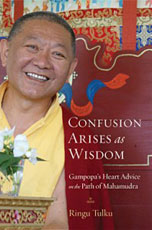Born in Eastern Tibet in 1952, Ringu Tulku has been professor of Tibetan studies for 17 years and a visiting professor at Naropa University in Boulder, Colorado, for five years. He is the director of seven meditation centers in Europe, the United States, and India. He is the author of several books including Path to Buddhahood.
In this text, edited by Ann Helm, Tulku offers astute commentary on 18 short but wise verses by Gampopa (1079 - 1153) who was the foremost student of Milarepa. The author begins with a lineage history of these teachings and a brief overview of Gampopa's life.
For the Tibetan Buddhist, devotion has three special qualities: inspiration, aspiration, and certainty. Devotion arises when we read the sutras, when we work with genuine spiritual teachers, when we spend time with others who cherish this practice, and when we meditate on death and impermanence. As Tulku points out in his commentary:
"The more we talk about the various aspects of devotion, the clearer it becomes how necessary it is. Devotion brings purpose and direction — we know what we want to do, what it will entail and what we can accomplish for ourselves and others. We find ourselves moving in a definite direction, which makes the path straightforward. This is why devotion is so important."
There is a saying in Tibet that goes: "To know what you were like in the past, look at what you are now. To know what you will be like in the future, look at your actions now." Tulku is convinced that if we want to know about our past lives or our future, we don't need the services of a fortune teller. All we have to do is be positive rather than negative; we need to form positive habits so that our future will produce good results.
Many subjects are covered here and it is only possible to allude to a few of them: three ways of bringing physical pain onto the path, clarity as the essence of the mind, the role of wisdom as the antidote to ignorance, connecting with our true nature through visualization, cultivating the art of taking things lightly, the qualities of a genuine teacher, the importance of recognizing the ordinary mind, and the ways in which a realized yogi is free.
Tulku refers to another Tibetan saying: "Don't hit yourself on the head," which means be kind to yourself and don't do things that are harmful or self-destructive. Although Gampopa intended that the following advice for doing well be used on a retreat, it can also be used in daily life:
"1. Have confidence in the instructions.
"2. Have confidence in your own ability.
"3. Have confidence in your experience.
"4. Have confidence in the view."
